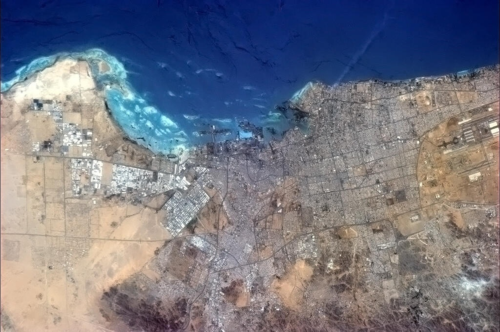John Robb's Blog, page 16
November 3, 2014
Killing to Extinction - Some Perspective

Bison kill off.
Pretty nasty image. It's offense to nearly everyone except sociopaths (every hunter I know would deplore this, particularly since it drove the species to near extinction).
However, this picture evokes emotions that are worth putting into perspective. Some thoughts:
We (human beings) are just a blip on the earth's timeline. We might not even be a major event on that multi-billion year time line. So maintain concern, but relax a bit.
Nature kills often and much more dramatically than this. It has in the past and will do so in the future.
The damage we are doing to nature via global warming (even a nuclear war) is much more of a threat to us than to nature. Nature will persist after we drive ourselves to exinction (inevitable).
FINAL NOTE >> Some people see this photo as an indictment of white men. It's important to understand that white men aren't the only bloodthirsty people on the planet. Every culture kills with alacrity. Even the American Indians drove species to extinction.
For example: The Clovis people who migrated from Asia -- this the migration 12-14 thousand years ago that led to modern American Indian tribes -- killed off the original settlers of the Americas. The original inhabitants of the Americans were a pre-Clovis migration of people from Asia who were genetically similar to tribes in New Zealand. The Clovis people also drove the North American horse, a species of horse that had survived for millions of years in the Americas before they arrived, to extinction.
Remember, when it comes to history, every culture has blood on its hands. That's a fact.
October 16, 2014
How ISIS will increase Saudi Arabia's Fragility
How would ISIS spread into Saudi Arabia?
More generally, how would an open source insurgency defeat a fragile dictatorship?
As I pointed out earlier, ISIS is already doing a great job marketing itself to young male populations (particularly young men in Saudi Arabia). That's to be expected. Open source insurgencies are very adept (many hands method) at finding the elements of the message that resonate (throw against the wall method), and then amplifying them a million fold via social media. We've seen this in Tunisia, Egypt, Libya and Hong Kong.
However, to tip the scale in favor of a fast collapse in Saudi Arabia, it's going to take a bit more than viral media. So, what are we likely to see?
Based on what we've seen open source insurgencies do in the recent past, we're likely to see a physical disruption of the infrastructure that supports Saudi Arabia's heavily urbanized (read: urban = fragile) population. This is likely to be very effective. Saudi cities have grown far beyond any rational limits, particularly given the constraints of their locations. This makes them extremely vulnerable to systems disruption (systemsD for short).

Jeddah (a beached whale of a target)
Jeddah (pic above) is a good example. Saudi cities like Jeddah are large and extremely dependent on the smooth functioning of critical infrastructure.
This extreme dependency makes them extremely good candidates for disruption by small groups of self-activating jihadis. In Jeddah's case, a couple of dozen small attacks on the water (in/out) and the electricity grid would almost certainly shut the city down. Further, as we've seen on numerous occasions (from Nigeria to Iraq), a small number of attacks is all that is necessary to keep the infrastructure in perpetual malfunction.
This type of disruptive attack, only requires a few individuals acting on their own to be successful. It doesn't require much planning and if these attacks are done correctly, there's only a small chance the attacker will be caught.
Despite that minimal requirement, the impact on battlefield would be extreme. How so? As we saw in Iraq, critical infrastructure will completely gut a city's economy by making anything but barter impossible to accomplish.
Further, these attacks won't create outrage against the attackers. On the contrary, this disruption (particularly if it is bloodless) will cause the population to resent the government since it's proving that it is unfit to rule the country by not delivering electricity, water, fuel, etc. services more than a couple of hours a day. Further, shortages will force much of the population to reaffirm their primary loyalties to the detriment of the national government.
The final benefit of this disruption, particularly if it is made deep inside Saudi territory, is that it will cause the royals to spread their forces thin in a useless attempt to prevent future urban disruption.
This means that when ISIS begins to make cross border raids, the Sauds will be far less likely to defeat them.
NOTE: Deep disruption is, incidentally, the same strategy that Lawrence of Arabia used against the Turks.
PS: Here's some basic info on systems disruption.
October 14, 2014
ISIS is the leading supplier of the most potent drug in the world
NOTE: I've turned on the comments for this one for feedback on this post.
Question: How would ISIS cross the "air gap" between their conquests in Iraq and Saudi Arabia?
Answer: It already has.
ISIS has become the leading supplier of the most potent drug in the world:
Zealotry
Further, Saudi Arabia is almost certainly one of their leading customers and they brought it on themselves.
More than half of Saudi Arabia's men are under 21 and most of those boys have been given a religious education in a strict literalist tradition. Further, they've been kept in time capsule, protected from many of the changes influences the rest of us.
To young men like this, ISIS is pure historical heroin. It's a jihad in the medieval tradition (made successful by using the techniques of open source insurgency).
This makes it far more compelling than the insurgencies against the Soviets in Afghanistan and the US in Iraq.
It also has all of the trappings of historical jihad. It has everything from the beheadings of unbelievers to war brides to the sprawling conquests over numerous foes.
To young Saudi men, it's an unstoppable and epic event.
A movement that can give a young man's life meaning. Meaning that can't be found in the hollow, timid commercial existence the west is forcing on us all.
For these young men, ISIS is a return to a virile Islam of the past.
An Islam uncorrupted by the grey, weak, and cowardly old men currently in charge. Men that deserve to die for their actions.
For them, ISIS is a chance to rewrite the rules of the world in a way they should be written. To be part of God's plan and to be part of destiny and not on the sidelines watching it happen.
_______
Zealotry like this is intoxicating in ways that people living in our modern, connected world can't even imagine.
We're too jaded, medicated, and appologetic (of any strongly held beliefs) to understand real zealotry (particularly on a mass scale).
Of course, Zealotry like this isnt limited to Islamic youth.
Global history is replete with it although it has recently become relatively rare.
For example, if you want to get a feel for Zealotry in the Japnese tradition, give Yukio Mishima's fantastic book: Runaway Horses a read.
Have fun.
JR
October 13, 2014
Big Question: Can ISIS take down Saudi Arabia? Probably...
ISIS is the open source insurgency (see Wikipedia) I warned about when I began writing Global Guerrillas back in 2004.
For example:
It operates very differently than the insurgencies we faced prior to Iraq.
It's composed of many groups held together by a simple set of rules (minimal vs. the maximum rule sets we see in nations).
It's fluid. It redily finds good use of new technologies and uses social media to good effect.
It embraces the global black market and thrives on criminal enterprise.
The groups participating in the insurgency learn and communicates stigmergically (see Nature 2009) -- which is similar to how we learn online. Try it fast --> copy anything that works (from targets to techniques to technologies).
Since there isn't a hierarchy, it can spread very quickly to new areas as new groups self activate to join it.
There's lots more.
The big question is when does ISIS stop expanding?
More specifically, can ISIS expand into Saudi Arabia?
Based on what I see: Yes.
If so, we're about to see an open source insurgency take down the heart of the Middle East.
Worse, the US government and its allies don't have a clue how to fight it nor any real desire to do so. They just wish it would go away.
PS: Even if the US and its allies did want to stop ISIS, they don't know how to fight an open source insurgency (the Sunni Awakening was dropped into their laps, it wasn't engineered). They are still trying to cram the round pegs of today's facts into the square holes of traditional models of insurgency.
The Real Existential Threat
What is the biggest threat to the world as we know it?
Answers range from climate change to peak energy to a pandemic...
None of those matter. They are all exogenous events. Challenges to be overcome.
The only real threat is a corrupt decision making system.
Simply, if our human built systems can't make good decisions, our system will collapse.
It's that simple.
The reason is based on what makes humanity different than all other forms of life. All other forms of life adapt through biological information exchange.
That means their improvement and future adaptation, as both individuals and as groups, is limited to the number of changes made to the DNA they pass on to future generations.
Humanity is different. We evolve socially rather than through biological processes.
Looked at from another perspective --> a human being without social information derived from millenia of experiences and adapatation is simply a smart animal.
The human built systems we build to pass on this information is what makes us different.
It's also the key to out future survival.
Why?
These human built systems aren't just static information repositories. They're not simply libraries where we store information for future generations.
They are decision making systems.
They are the systems that allow us to adapt to changing circumstance. The success of these decision making systems are the reason we've been able to populate every corner of this world and why we are still alive today.
So far, we've been able to make the right decisions despite the odds being stacked against our future survival.
The best example of this is how we've found a way to avoid global thermonuclear war for almost seventy years... despite the presence of tens of thousands of nuclear weapons in US, Russian, and Chinese bunkers as well as numerous provocations to use them.
The simple truth is, if our social decision making systems are sound, we'll avoid catastrophe. If not, disaster.
The big question we all should be asking: is our decision making system corrupt and if so, can we fix it or not?
October 11, 2014
The Internet of Chains
My friend Jeff Garzik (bitcoin core dev) nailed it on Twitter:
This single-chain thinking is not scalable. Memo to Counterparty, Mastercoin, Ethereum, et. al. The future is an Internet Of Chains.
He's right.
It's the same conclusion I stumbled into while doing some scifi writing over the past couple of weeks -- the scenario building required really zooms my systems thinking in a very good way.
Let me recast this a bit. The future of the Internet is a confederation of chains.
Chains that'll do almost everything.
Chains that act like companies (without any of that "organic and financial overhead" that costs us so much).
Chains that cut across borders.
Chains for closed social networks. Chains for virtual legal systems. Chains for industries...
Even chains for global insurgencies and alternative economies (the topic of my new book).
Lots of chains.
It's inevitable at this point. Bitcoin was simply the plausible promise of what was possible with this tech.
I'm also getting a very good feel for how this is going to roll out and what I'm seeing is pretty cool.
How so?
The rollout of these blockchains is going to be full on creative destruction.
Chains will generate or control more wealth in the next two decades than the world has produced since inception.
They also enable us to destroy wealth with equal alacrity by allowing us to shift our thinking on what we consider valuable (to the old and currently wealthy --> you are toast).
This is going to be fun. To the victors the spoils!
October 10, 2014
Blockchain Companies
It should be pretty clear that the economy we have today is holding us back.
It's an amoral, debt-riddled system that is riven with corruption and wracked by periodic bouts of extreme instability. Worse, on its current path, the 'turking" future it's building for us is pretty damned grim.
Worse, there's no way to fix this system. No reform is possible. The rot is in the foundation because it is obsolete. It rests on assumptions that are as out-dated, limited, and as dangerous as those that underpinned the agrarian, aristocratic economy it replaced over the last five hundred years.
This means there's only one way to replace it.
It can only be done through wholesale creative destruction. The new economy needs to grow in a way the old system can't corrupt it.
The only vehicle that can do this quickly and in a way that yields a positive results is something called a blockchain company. A company that operates using the same tech that bitcoin uses.
A blockchain company isn't like any company you know.
It's not run organically (it doesn't have faux person-hood). It doesn't have CEO, COO or effing board of directors. It doesn't go to a fund or a bank for funding. It never floats an issue on Wall Street. Blockchain companies don't need all of that legal cruft and the parasitic overhead that comes with it.
The entire company is simply open source software. It's built to provide a function and divide up the rewards of providing that function to the participants.
A company like this runs as software, in the same way bitcoin is run: decentralized. That means the company doesn't pivot, reorganize, or recapitalize. It either provides a useful function it gets paid to do, or it doesn't. If it doesn't work, it is replaced by a new company that does it better.
A blockchain company doesn't have shares of stock. Everything that it earns is paid to the people in possession of the companies coin on a pro rata basis (using the blockchain currency of choice). Ownership is simply a call on this revenue, and all it is paid out in real time.
Earning a blockchain company's coin is done by the company's participants. You can earn coin doing everything from providing cloud services to doing the same types of stuff you already do online (writing, rating, and curating). There are ways to measure all of this and connect these activities to revenue.
Investment, to the extent it is needed to launch a venture is crowdsourced, usually by prepurchasing goods and services to be delivered in the future.
A blockchain company doesn't need Silicon Valley, Wall Street or Washington.
It just needs to be open, decentralized, and useful enough to suck value out of the old economy.
Time horizon on this?
Five to ten years. When it rolls out, the old economy will look fairly quaint and stagnant in comparison.
PS: It's a simple fact that almost all of the new value being created today is virtual. All of this virtual value can be created by blockchain companies at rates and quality levels that are orders of magnitude better than what we see today.
PPS: So far, most tech advances have only obsoleted discrete industries. This one is aimed at the guts of the financial system and everything attached to it.
October 3, 2014
GG UPDATE - October 3 2014
Some interesting stuff:
How to turn America around. A million new owners at a time.
Federal Bureaucracy blocks cleaning crews from cleaning up Ebola quarantine site in Dallas. People quarantined left to protect themselves with bleach and prayer. Classic. 4 days and no cleanup.
One party state supports big brother drone. Jerry Brown, the Democratic governor of California, vetoed a bill requiring warrants for drone surveillance. Chris Christie, the Republican governor of New Jersey, vetoed a bill earlier this year that would have given the citizens of NJ protection against abusive drone surveillance.
A man was arrested for shooting down a drone flying over his house with a shotgun. Bail was set at $2,500. The drone belonged to a neighbor, who was flying it over the construction site of a friend's home nearby.
Hackers had root access to JP Morgan servers for months. Think about that for a second. They had access to everything at JP Morgan, one of the most security aware companies on the planet....
USAA seeks FAA exemption for using drones to access insurance claims. USAA is one of the best run financial companies in the world.
October 2, 2014
A missed opportunity to break up ISIL. We were focused on the wrong stuff.
 ISIL is an open source insurgency.
ISIL is an open source insurgency.
That means it is composed of many groups. Groups that don't share the same motivation for war.
Yet, all of these groups can work together if they agree on a single goal.
Occasionally, fractures in the insurgency emerge.
Usually this is due to a power grab by one of the groups in the insurgency after a string of victories.
When this happens, the insurgency is vulnerable.
That's exactly what happened in Iraq a couple of months ago according to AJ.
Sunni insurgent groups like Naqshbandi, the Mujahedeen army, the Rashedoun army , Ansar al-Islam and Ansar al-Sunnah started to put some distance between themselves and ISIL.
ISIL was able to negotiate a settlement in September. It's sending these groups more money and weapons, as well as allowing them to take a defensive (rather than an offensive) role in the conflict.
The rift was healed and the opportunity lost.
I guess the collective west was too busy sending jets to bomb sand (futile) and setting up a divisional HQ (for careerists to get their tickets punched) in Iraq to notice. What a joke.
October 1, 2014
Creative Destruction to Raze Wall Street to the Ground
Wall Street exists due to one reason.
It was built to overcome the limitations of the information system our economic system was built on. Limitations that we didn't have the technology to overcome (until now).
To work around these limits we built the financial system.
Its job was to regularize this flow of information (accounting and contracts), discover new information (due diligence), and analyze it (audits, etc.) so as to find the best places to invest the surplus income of the economy.
However, that role has led to a problem. The financial system actually thinks they are the reason for the success of the economy, and not just a patch for an information problem. They don't believe they are simply overhead that we can eventually do without if we improve the way our economy works.
Worse, the people inside the financial system have found ways to rig it so that they always win, even when they should lose (if you didn't learn than in 2008, you are an idiot).
NOTE: the communists tried to solve this information problem with massive bureaucracy. That approach, obviously, delivered results worse than our financial sector. But the bad behavior in their bureaucracy and our financial sector by elites enamored with themselves is amazingly similar.
The result of this malfeasance in the financial sector?
Instead of doing the innovation required for economic progress as we did prior to WW2, the US has taken the easy road to economic "growth."
We borrowed it. We borrowed money to grow our government bureaucracy and our financial sector (they are symbiotic).
How much did we borrow? The US has taken on a staggering $60 trillion in debt (1/3 gov't, 1/3 households, 1/3 corporate) since WW2.
The generations that led the country after WW2 drove it over a cliff.
Fortunately, there's reason for a bit of hope.
It may be possible to route around the damage caused by Wall Street and the government bureaucracy that enshrines it.
How?
We've got some new tech that makes it possible for us to radically increase information flow in our economy, so much so, that it's possible to toss most of what the financial system does into the scrap heap of history.
I've written up an explanation for this on HomeFree.
Give it a read.
It boils down to this: you should own a part of company that you buy a product or service from + you should earn ownership from every site you contribute to.
If you are a customer for product (even a product to be built in the future) or a superuser on a site, you are in the best position to decide the future of the company. Not some schmuck on Wall Street.
All the tech is ready for this and lots of early examples.
All it takes is for perceptions/expectations to change. It needs people to demand it.
PS: I wrote about this next topic back in 2010 and most people didn't understand it. Most people won't understand it now, despite the fact it's starting to happen.
PPS: Coase makes a good case that corporations were built to overcome the information limits of contracting in an economy. This is a similar argument, but applied to the entire economy.
John Robb's Blog
- John Robb's profile
- 17 followers






